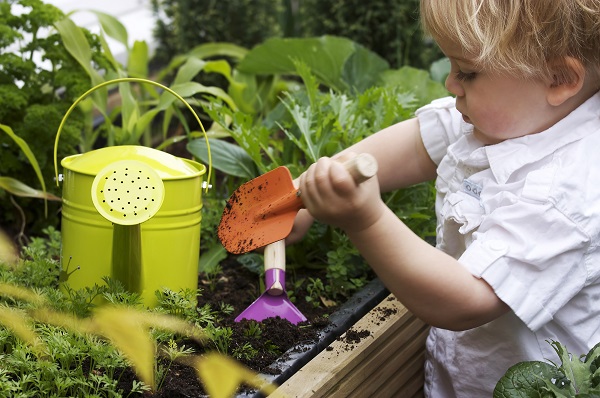 Do you want to pass your love of gardening on to your children or grandchildren? Gardening with kids is a great way to get them offline, outside and give them a lifelong, productive hobby.
Do you want to pass your love of gardening on to your children or grandchildren? Gardening with kids is a great way to get them offline, outside and give them a lifelong, productive hobby.
Kids and Gardening: Getting Started
It’s easiest to get your children or grandchildren started gardening when they’re around age five. Kindergarten-age children are old enough to remember the difference between weeds and plants that you actually want. They’re also very curious about everything around them and love “helping” you.
It can take some prodding to interest older children in gardening. Online farming games are very popular. If your older child is playing a farming game, present gardening to them as the real-life version. Give them their own plot of your garden or flowerbed. When they start to see seedlings coming up or flower buds appearing, they may find real life gardening more fun than a game.
Kids and Gardening: Tools You’ll Need
Real, sturdy gardening tools scaled down for children are available in dollar stores. One thing all young children love is playing in the dirt. Give your child a shovel so she can help you with your spring flowerbed. Your plants may not be spaced perfectly, but your child will feel a sense of accomplishment.
Another thing young children love is water. Your child will love having his own watering can. Watering plants gives you an opportunity to talk to your children about the importance of caring for plants while not wasting water.
Older children can learn to use pruning shears under your supervision. Kids can help you deadhead flowering bushes. You may feel safer letting your child use blunt scissors and then move up to a small pair of pruning shears as they get older.
With a small rake, your child can help you clean out flowerbeds in the spring. If you have a rock garden, let your child work with you and learn to keep it neat.
Kids and Gardening: Choosing Plants
Before you take your child into your garden, make sure the plants they’ll be exposed to aren’t toxic. Your landscaper can suggest non-toxic, child-friendly plants.
Choose plants that germinate soon after planting so kids won’t lose interest. Sunflowers are a great choice. Their seedlings pop up in about a week, and the “mammoth” varieties can top out at five feet tall.
Sunflowers are drought-resistant and make a classic border for a vegetable garden. If you want your child to love fresh vegetables and herbs, get them involved in growing their own food.
Tomatoes and basil are a perfect combination for a kitchen garden. Basil grows quickly, and you and your child can harvest it almost daily. A tomato plant’s life cycle is interesting, and the fruit, paired with fresh basil, can help your child develop a taste for vegetables.
A landscaper can prepare flowerbeds and vegetable plots for you and help you choose plants kids will enjoy.
Things to Remember:
- Keep it fun and entertaining
- Give kids tools made for small hands
- Make sure seeds and plants are non-toxic
- You should have fun too
Contact us today and we’ll get your yard in shape so you can start gardening with your kids.
